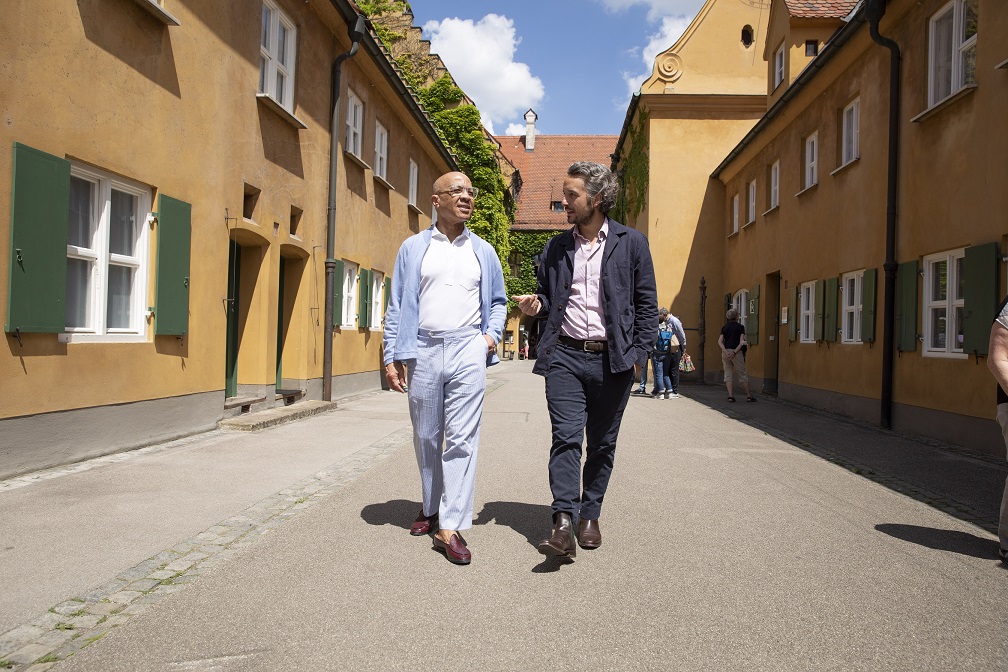Few things have remained constant over the past five centuries. The Fuggerei–the world’s oldest social housing complex in Augsburg, Germany–is a rare exception. Founded by Jakob Fugger, a wealthy merchant, in 1521 for “eternity”, the Fuggerei provided a home for needy Catholic Augsburg residents and continues to do so today.
The complex currently consists of 67 buildings with 142 residences. The rent has remained unchanged from the outset–currently 0.88 Euro per year and three daily prayers for the Fugger family. The Fuggerei continues to operate based on seven social challenges: strengthen self determination and dignity, give safety, guarantee humanistic values, develop spirituality, create living space, generate sustainability, and cope with neediness. “These all come together very smoothly,” Countess Isabella von Thun-Hohenstein, one of the board members of the Fugger foundation, told The Tablet.
Catholic values and spirituality, especially, have always been central to the Fuggerei. “The Fuggerei will always be a haven for those that have a common value system that is based right now on Catholic beliefs,” Thun-Hohenstein said. The complex has its own church and priest.
“We do hope that people are able to live their Catholic belief peacefully, in their own way, in their own church, with their own priest, and we are strong defenders of this principle,” she said.
Earlier this year, the Fuggerei celebrated its 500th anniversary with a five-week celebration which looked towards the future as part of its Next500 initiative. New establishments are already being discussed in Sierra Leone and Lithuania, and in an address at the opening ceremony, European Union President Ursula von der Leyen said the model could be used to help rebuild Ukraine.
“While fighting continues in Ukraine and the country struggles to end the violence, we are already planning with the Ukrainian government to rebuild the country. It will take strength to rebuild the bombed-out cities, but therein lies also huge opportunities,” von der Leyen said, adding that the Fuggerei “could be an inspiration” in Ukraine due to its its sustainable and people-centered approach.
“The original in the city of Augsburg, could become a global network of Fuggerei’s around the world,” said Augsburg’s Lord Mayor Eva Weber, adding that the original was created when Augsburg was struggling with familiar challenges such as a pandemic and a housing shortage.
However, Thun-Hohenstein stressed that the Fuggerei should not merely be recreated in another location; it must be informed by the local context and needs. “There are many people currently who use the phrase or slogan, “act local, think global, but I suggest that is actually something that we’ve been doing for 500 years. Our concept is so sustainable, but it is also local and we just want to pass our knowledge gained over the test of time, on to future generations.”
Other guests at the Next500 initiative included American foundation leaders Rip Rapson of the Detroit-based Kresge foundation and Darren Walker of New York’s Ford foundation.
“What the Fuggerei model looks like in a place like the United States is less one foundation holding the whole, than the foundation community, and the business community, and the public sector, trying to figure out in a particular geography how these different pieces come together,” Rapson told The Tablet.
Rapson highlighted examples, including the Harlem Children’s Zone, an area of roughly 100 city blocks in New York in which every young person has access to interconnected supports in every area of life, including education, health care, job training, and the arts. At first glance, it may seem quite far removed from the Fuggerei, but it is an example of how the principles can be applied to other communities.
“It’s not like you’re going to go grab a vacant piece of land somewhere and create a commune,” Rapson said. “That’s not the important lesson of the Fuggerei. I think the Fuggerei lesson is to say, what are important qualities to people’s quality of life and values? And then how do you create synergies among those building blocks in a way that creates something that endures as a whole?”
Illona Barber was originally from Augsburg but had lived in the United States, where she worked as a musician and in the retail industry. When she returned to Augsburg after retiring, she didn’t have enough savings, so she decided to apply to the Fuggerei. Barber stays busy by taking care of her pets, painting, and helping out with various tasks around the complex.
Barber says she enjoys the free time retirement offers, often spending time with her neighbors, going out to dinner or to the beer garden. “Normally, you say in retirement, you don’t have [any] time,” Barber said. “But we do have plenty of time.”
“Every individual has a very individually sad experience of why they’re there,” said Thun-Hohenstein.
“There’s a system of caring between the residents and between us, the administration,” said Count Wolf-Deitrich von Hondt, the administrator of the Fuggerei who also lives in the complex.
The Fuggerei has survived various challenges over the past half millennium, including several wars. It was severely damaged during the second world war, and the family decided during the night of the bombing that they would rebuild it as soon as possible. “We always kept our independence,” Thun-Hohenstein said. “We have never sided with anyone over these many centuries. And even now, we’re independent from any state finances.”
Jakob Fugger, often referred to as “The Rich,” is still considered one of the wealthiest people to ever live due to his businesses in precious metals, goods and financing that spanned Europe. “The Fuggerei is still living off the clever, well-founded investments of our ancestors,” Thun-Hohenstein said, which mostly consists of forests owned by the family in addition to some property. The foundation also charges an admission fee for tourists who come to the Fuggerei.
“We are now, especially after the 500 year jubilee, looking into hopefully raising awareness in order to attract partners who can help fund projects,” Thun-Hohenstein said. “Such funding would be wholly project-related and we would obviously be very clear exactly where the money from generous funders would go.”
The Fuggerei is still going strong after more than five centuries of existence, and the Next500 initiative provided a platform for discussion as to what the future holds. The Fuggerei is well-positioned to address other major challenges, including sustainable living. “I think we are obviously clearly sustainable with the history of 500 years, and we’re obviously also getting our income from a sustainable resource from the forest,” Thun-Hohenstein said.
Foundations such as Rapsons’ may play a role in future, and the establishments in Sierra Leone and Lithuania have already entered advanced discussions. The Fuggerei hopes it can provide a model for these new establishments, with one value above all others, according to Thun-Hohenstein: “We see the human being in the centre of all our action.”



 Loading ...
Loading ...